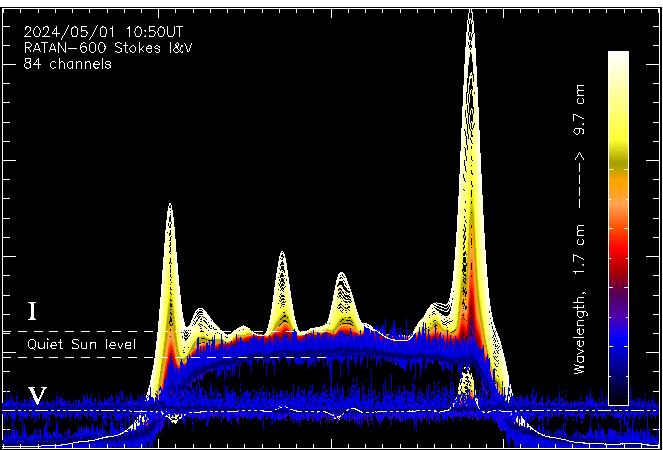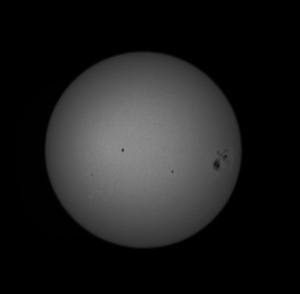Results of daily monitoring of the Sun in the radio-frequency range
Three day radio-astronomical forecast of the proton activity of the Sun: 
The figure shows multiwave radio emission scans—graphs of the distribution of intensity I and circular polarization V across the solar disk, obtained at RATAN-600. The color scale on the right corresponds to 80 wavelengths in the range from 1.65 cm to 10 cm. The upper left hand corner shows the date and time of obtaining the radio data (the archive data can be found on the page with more detailed information). Polarized emission V characterizes the magnetic-field strength in solar active regions. The large deviations in the graph indicate the presence of regions with strong local magnetic fields, which are seen as sunspots in the visual range.
The dashed lines indicate the range of intensity I levels of the quiet-Sun emission at different wavelengths. Sharp peaks rise against the background of this emission, representing the radio-emission intensity of the active regions. As time passes, they shift on the graph from left to right, corresponding to the direction and velocity of the rotation of the Sun. The absence of peaks indicates weak solar activity. In this case, the occurrence of a powerful flare that allows the protons to reach the Earth is least likely.
The Tanaka-Enome criterion is used in the forecasts of flare activity based on the RATAN-600 observations. According to this criterion, for a proton flare to arise, the flux of radio emission must be sufficiently high at short wavelengths (blue color scans) and should increase with time compared to the general intensity. If this criterion is fulfilled, the probability of a flare over the next 3 days is at the level of 75-80%.
A quantitative estimate and the conclusion about the possibility of a flare are obtained using a system of automated reduction of the presented solar scans. The result of these computations is presented in the form of a “positive” or “negative” report, depending on whether the forecast of the occurrence of a proton event is positive over the next 3 days or no flare is expected during this time.
For more detailed information about the condition of the Sun, both in the radio and other ranges, click on the image.
More about the solar activity.
View of the Sun in visible light.
Telescope-reflector 200 mm, F/5
Canon 450D with aperture filter Seymour Solar SF 950
11:28 UT, 27.10.2014
exposure 1/800 s.
Photography by Semenko E.A., Sarkisian A.N.



